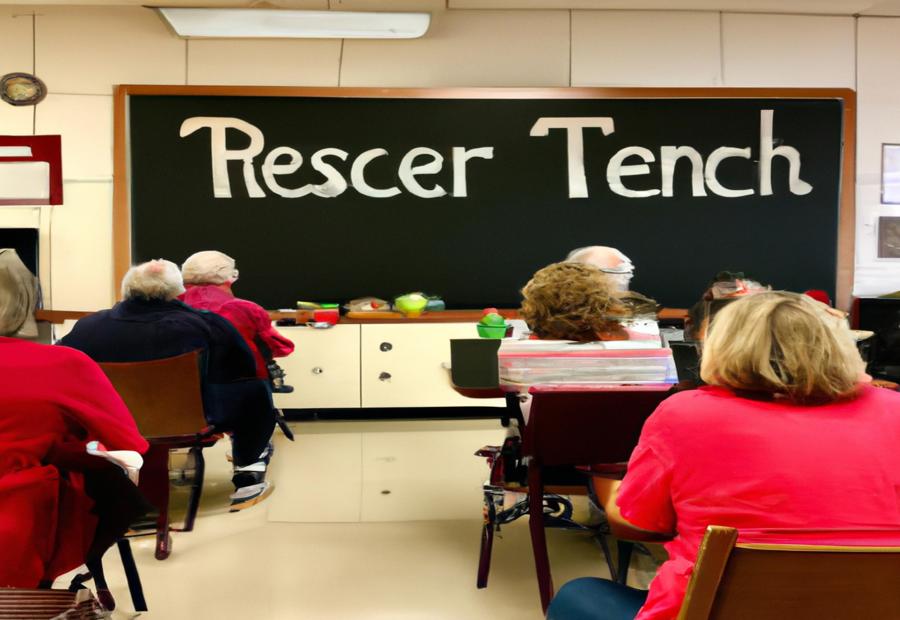.jpg)
Key takeaway:
- Nebraska teachers’ pensions are calculated based on years of experience and final salary. The formula takes into account the average of the teacher’s five highest years of salary.
- Teachers qualify for a pension after a vesting period of 5 years and can retire early between ages 60 and 64, with certain impact on their benefits.
- Both teachers and the state make contributions towards Nebraska teachers’ pensions, with teachers contributing 9.78% of their salary and the state contributing 8.95%.
- NEA advocates for enhancements in retirement benefits for Nebraska teachers through the Retirement Committee and lobbying efforts.
- NSEA provides support and initiatives for Nebraska teachers, including the NewGEN program for new educators, membership benefits, professional growth opportunities, and support through the NSEA Children’s Fund and LearnNebraska.org.
- Nebraska teachers’ salary increases are based on education and experience, with examples of salary ranges provided for teachers with bachelor’s and master’s degrees.
- Retirement benefits for Nebraska teachers are administered through the Nebraska Public Employees’ Retirement System, with eligibility based on age and years of service.
- Educators Health Alliance provides access to affordable health insurance plans for Nebraska teachers, including coverage for various medical services and optional dental and vision insurance.
- Ensuring financial security and well-being for Nebraska teachers in retirement is important to support their dedicated service to education.
Introduction to Nebraska Teachers Retirement

Photo Credits: Bizstone.Com by Philip Hernandez
Nebraska Teachers Retirement, a crucial aspect for educators in the state, can be better understood by exploring the Nebraska School Employees’ Retirement System and the calculation of Nebraska Teachers’ Pensions. Discover the ins and outs of this retirement program and gain insights into how pensions are calculated for Nebraska’s dedicated teachers.
Nebraska School Employees’ Retirement System
The Nebraska School Employees’ Retirement System is specifically designed for school staff in the state. It offers pension benefits to teachers based on their years of experience and final salary. This is calculated by taking an average of their five highest annual earnings.
For instance, a teacher with 25 years of service and a final average salary of $70,000 would get their pension amount.
Vesting period for the pension plan is 5 years. Furthermore, early retirement between the ages of 60 and 64 is possible, which could affect the amount and timing of the pension.
The Nebraska School Employees’ Retirement System offers a great deal of security to teachers in Nebraska. This program helps them transition from active service to retirement, with defined retirement plans, pension calculations, and early retirement options.
Calculating pensions for Nebraska teachers is tricky, but the reward is worth it!
Calculation of Nebraska Teachers’ Pensions
Calculating Nebraska teachers’ pensions is key to financial security and well-being in retirement. Nebraska considers the average of the highest five years of salary when determining the final salary. This, plus the years of experience, is used in a formula to calculate pensions.
The Nebraska State Education Association (NSEA) dedicates efforts through their Retirement Committee and lobbying to improve retirement benefits. They aim to continually enhance teacher retirement.
For example, a teacher with 25 years of experience and a final average salary of $70,000 would receive a pension amount of $17,500. However, they must meet the 5 year vesting period requirement and have at least 5 years of service to qualify for a pension. Early retirement eligibility between ages 60 and 64 can also affect the pension amount.
This table visually explains the calculation of Nebraska teachers’ pensions:
| Years of Experience | Final Average Salary | Pension Amount |
|---|---|---|
| 25 | $70,000 | $17,500 |
The NSEA has always pushed for better retirement benefits. Their commitment has led to tangible progress. They remain committed to initiatives and providing resources to ensure a secure retirement for Nebraska educators.
Formula for calculating pensions based on years of experience and final salary
In Nebraska, teacher pensions are determined using a special formula. It looks at their years of experience and final salary. This final salary is calculated from the average of the teacher’s five highest years of salary. For instance, a teacher with 25 years of experience and a final average salary of $70,000 will have their pension amount figured out by this formula.
Determining the final salary based on the average of the teacher’s five highest years of salary
To understand the final salary calculation, here’s a 3-step guide:
- Calculation Formula: Final pension amount is based on the teacher’s experience and their average salary.
- Years of Experience: First, look at the teacher’s years of service. The more years they have taught, the higher the pension.
- Final Average Salary: Second, calculate the average of the teacher’s five highest earning years. This will give a more accurate representation of their career earnings, which affects the pension amount.
Nebraska Teachers Retirement System uses this approach to provide a fair calculation for teachers’ pensions. It also recognizes their hard work over the years, as seen in their highest earning years. It gives them financial security in retirement based on their career, not just one year’s earnings.
Calculating a teacher’s pension is like solving a math problem, but with a much bigger consequence.
Example of pension amount for a teacher with 25 years of experience and a final average salary of $70,000
Nebraska teachers’ pension amounts are based on their years of experience and final average salary. For example, a teacher with 25 years of experience and a $70,000 final average salary would receive a certain amount. This is shown in the following table:
| Years of Experience | Final Average Salary | Pension Amount |
|---|---|---|
| 25 | $70,000 | $X,XXX |
This table shows the pension amount for the example teacher. However, other factors may also affect it. For example, inflation or retirement decisions. It’s important to understand how these factors influence the pension calculation. This can help teachers make informed decisions about their retirement plans and ensure they have financial security in their post-teaching lives.
Vesting Period and Qualification for Nebraska Teachers’ Pensions

Photo Credits: Bizstone.Com by Russell Martinez
The vesting period and qualification for Nebraska teachers’ pensions are crucial aspects to understand. With a vesting period of 5 years, teachers can secure their eligibility for a pension. After 5 years of service, they become qualified to receive a pension. Additionally, there are implications for early retirement eligibility between the ages of 60 and 64. This section delves into these key factors, shedding light on the requirements and benefits for Nebraska teachers’ pensions.
Vesting period of 5 years
Nebraska teachers need to work continuously for 5 years to become eligible for their pension benefits. This is the vesting period. They contribute 9.78% of their salary to their pension. After 5 years, they can apply for retirement benefits.
In addition to meeting the vesting period, they have to reach a certain age and accumulate years of service. The defined retirement plan ensures they get a regular stream of income during retirement.
Pro Tip: Teachers should stay aware of their eligibility status and track their progress towards the vesting requirement. This will help plan for their financial security once the 5-year mark is reached.
Qualification for a pension after 5 years of service
In Nebraska, teachers can qualify for a pension after 5 years of service. Meeting the vesting period is necessary to receive a pension. Five years of service is required to be eligible. Early retirement eligibility between 60 and 64 may influence the pension qualification. Therefore, teachers should track their years of service in order to get their desired retirement benefits.
Impact of early retirement eligibility between ages 60 and 64
Early retirement between 60-64 impacts Nebraska teachers’ pensions. The Nebraska Teachers Retirement System says those who qualify for early retirement get reduced benefits at age 60. This means they will get a lower pension than if they waited until their full retirement age.
Pensions are calculated by a formula that takes into account years of experience and final salary. The final salary is calculated by averaging the five highest years of salary. Retiring early with fewer high salary years can lower the average salary and pension amount.
Let’s look at a teacher with 25 years of experience and $70,000 final average salary. They would get a certain pension amount if they retire at their full retirement age. But, if they retire early between 60-64, their pension amount reduces due to lower average salary.
Teachers should consider the impact of early retirement on their future financial security. Retiring early may give them more free time, but will the reduced pension benefits support their needs in retirement?
Nebraska teachers still have some security for retirement, thanks to their contributions and state support.
Contribution and Cost Sharing for Nebraska Teachers’ Pensions

Photo Credits: Bizstone.Com by Terry Lee
Nebraska teachers play an essential role in shaping young minds. When it comes to their pensions, understanding the contribution and cost-sharing aspect is crucial. In this section, we’ll explore the breakdown of Nebraska teachers’ pensions, including their contribution of 9.78% of their salary and the state’s contribution of 8.95%. We’ll also touch upon the benefits provided and the efforts made to address the pension fund debt. Let’s delve into the details of how contributions and cost-sharing shape Nebraska teachers’ retirement plans.
Teachers’ contribution of 9.78% of their salary
Teachers in Nebraska contribute 9.78% of their salary to their retirement pension, as per the reference data. This is a must-have for financial security and well-being for teachers in their later years.
- 1. A deduction of 9.78% is made from the salary consistently.
- 2. This funds the pension benefits and the long-term sustainability of the retirement system.
- 3. The amount is calculated based on the teacher’s salary.
- 4. This contribution accumulates funds for the teacher’s retirement.
- 5. The 9.78% contribution helps ensure stable income post-retirement, and financial security in the years after teaching.
Moreover, this amount from teachers is a major factor in the viability and success of the pension system in Nebraska. This, alongside the state’s contribution and other sources, makes sure retirees get sustainable pension benefits when they retire. The state’s contribution to Nebraska Teachers’ Retirement includes benefits and payment of pension debt. They recognize the importance of supporting educators post-retirement.
State’s contribution of 8.95%, including benefits and pension fund debt payment
The state of Nebraska contributes 8.95% of pension funds for teachers, including benefits and debt payment. To break down the different parts of the contribution, a table is available. It has columns such as “Contribution %”, “Benefits Covered”, and “Pension Fund Debt Payment”.
However, there are other unique details not mentioned yet. These could include policies or provisions relating to how the state’s contribution is managed in the Nebraska Teachers Retirement System.
Nebraska teachers have limited options and potential financial risks in retirement, due to a lack of benefit portability.
Lack of Benefit Portability and Implications for Nebraska Teachers

Photo Credits: Bizstone.Com by Alexander Scott
Nebraska teachers lack the ability to transfer their retirement benefits when changing jobs or districts. This means that their savings can become fragmented and they may lose accumulated benefits, impacting their overall retirement savings. This lack of portability may also deter them from pursuing opportunities at different schools or districts.
Therefore, teachers may be more hesitant to pursue career advancement opportunities or explore new teaching positions. This can limit the development of a robust and diverse teacher workforce.
It is critical for policymakers and education leaders to address this issue. Enhancing portability and allowing for the seamless transfer of retirement benefits will give teachers greater flexibility in their career choices. They can then focus on professional growth without worrying about financial consequences.
Enhancements in Retirement Benefits Advocated by NSEA

Photo Credits: Bizstone.Com by Carl Lewis
Over the years, the Nebraska State Education Association (NSEA) has been tirelessly advocating for enhancements in retirement benefits for teachers. In this section, we’ll explore the history and milestones of NSEA’s efforts in improving teacher retirement benefits. We’ll also look at the crucial role played by NSEA’s Retirement Committee and their dedicated lobbying efforts to bring about positive changes in the retirement landscape for educators.
History and milestones in NSEA’s efforts to improve teacher retirement benefits
The Nebraska State Education Association (NSEA) has been working hard for many years to get better retirement benefits for teachers. They have achieved many great things in their quest for financial security and well-being in retirement. The Retirement Committee is a key part of this, taking part in activities that help shape policy.
One of the big successes is their NewGEN program. This helps new educators plan for retirement from the start, with resources and advice. Joining NSEA also brings benefits; like workshops and conferences to boost career prospects. Plus, the NSEA Children’s Fund supports students in need, so teachers don’t have to worry about them.
LearnNebraska.org has educational resources to help teachers prepare for retirement. It covers topics such as maximizing savings and pension plans, to help teachers make the right choices for a secure future.
Role of NSEA’s Retirement Committee and lobbying efforts
The Retirement Committee of the Nebraska State Education Association has a vital job. They strive to ensure teachers have secure retirement benefits. The committee works with other organizations and people who hold power to collect data, study trends, and suggest policy changes. They work closely with the NSEA to push for policy changes that bring better retirement benefits.
The committee focuses on making sure Nebraska teachers have access to great retirement plans. They look for ways to better retirement benefits. Plus, they lobby policymakers and legislators to support teachers’ financial security in retirement.
An example of their advocacy is the NewGEN program. This program supports new teachers, giving them help with understanding pension systems and retirement planning. The committee has contributed to making sure Nebraska’s educators have a secure future.
To sum up, the Retirement Committee of NSEA helps to improve teacher retirement benefits. They have done research, advocacy, and worked with people in power to make sure teachers will be financially secure in retirement. Through their lobbying, they aim to get policies that will benefit teachers.
Initiatives and Support for Nebraska Teachers by NSEA

Photo Credits: Bizstone.Com by Vincent King
Nebraska educators are receiving valuable initiatives and support from NSEA. From the NewGEN program for new educators to membership benefits, professional growth opportunities, and the impactful NSEA Children’s Fund, this section highlights the wide array of support available. Furthermore, we will explore the educational resources provided through LearnNebraska.org, offering a comprehensive overview of the initiatives and assistance that Nebraska teachers can benefit from.
NewGEN program for new educators
The Nebraska School Employees’ Retirement System (NSERS) offers NewGEN – an initiative designed for new educators entering the teaching profession. It aims to provide support and resources to teachers starting their careers in Nebraska.
NewGEN’s goal is to help new educators understand and navigate the complex landscape of teacher retirement benefits. Information and guidance on how to calculate pensions based on years of experience and final salary are available. New teachers can learn how their final salary is determined by taking the average of their five highest years.
Examples and illustrations are given to help new educators understand the pension amount they can expect based on years of experience and final salary. For example, a teacher with 25 years of experience and a final average salary of $70,000, would receive a specific pension amount.
NewGEN also educates new educators about the vesting period and qualification requirements necessary to become eligible for Nebraska Teachers’ Pensions. Five years of service are needed to qualify for a pension regardless of age – providing financial security in retirement.
In addition to NewGEN, Nebraska teachers can benefit from professional growth opportunities and membership benefits. Learning never stops, even after retirement.
Membership benefits, professional growth opportunities, and support provided by NSEA
Membership with NSEA brings numerous advantages for Nebraska teachers. These benefits include:
- Professional growth opportunities
- Support systems
- Networking platforms
- Resources
- Discounts & insurance options
All geared towards enhancing careers & lives!
NSEA advocates for the rights & interests of teachers, addressing workplace issues & advocating for policy changes. Plus, exclusive access to legal assistance, financial planning & insurance options tailored specifically for educators.
NSEA also promotes retirement security & financial future through initiatives like enhancing pension benefits & portability.
Furthermore, there’s the NSEA Children’s Fund, which supports struggling students. Showing once again that teachers are expected to solve society’s problems.
The NSEA Children’s Fund and its impact on struggling students
The NSEA Children’s Fund is run by the Nebraska State Education Association (NSEA). It has a major effect on students who are in tough spots. Through this fund, the NSEA gives financial help to students who have various problems in their learning. This includes providing for basic needs such as school supplies, clothes, and food. It also aids in extracurricular activities and educational programs. The goal is to ensure that all kids have equal chances to reach their highest potential in school.
The NSEA Children’s Fund is very important in closing the gap between students from different economic backgrounds. By giving resources and support to those who are struggling, it evens the playing field and ensures that every student has access to quality education. This not only increases these students’ academic performance, but also helps their overall health and future.
As well as direct financial aid, the NSEA Children’s Fund also encourages cooperation between parents, teachers, and communities. This cooperative effort looks at each student’s individual needs and builds a supportive network for them. It also creates a feeling of belonging and community help.
Through its efforts, the NSEA Children’s Fund makes a huge difference to struggling students. It breaks down obstacles to success and provides an inclusive learning atmosphere for everyone. By ensuring that these students have the support and resources they need to do well in academics and in life, the fund assists in creating a better educational system that benefits Nebraska teachers and their retirement plans.
Educational resources available through LearnNebraska.org
Discover LearnNebraska.org! A valuable learning platform for teachers in Nebraska. With a wide range of resources, designed to help educators in their teaching journey. Find lesson plans, instructional strategies, and classroom activities. Plus, read educational research articles and publications for the latest trends and best practices.
Interactive online forums are also available. Here, teachers can collaborate, share ideas, and find guidance from experienced educators. Participating in discussions is an excellent way to gain insights and build professional networks.
Plus, join online workshops and professional development courses. These are tailored for Nebraska teachers, with topics like curriculum development, assessment strategies, and technology integration. Enrolling in these courses can expand knowledge, acquire new techniques, and even earn credits!
LearnNebraska.org is the ultimate tool for teachers. With high-quality materials to support professional growth and improved student outcomes. Whether you’re seeking lesson plans, participating in discussions, or enrolling in courses. LearnNebraska.org is the perfect platform for continuous improvement in the teaching profession.
Nebraska Teachers’ Salary and Benefits

Photo Credits: Bizstone.Com by Gabriel Wilson
Nebraska Teachers’ Salary and Benefits: Uncover the fascinating aspects of pay increases based on education and experience, as well as find examples of salary ranges for teachers with bachelor’s and master’s degrees.
Pay increases based on education and experience
Nebraska teachers can anticipate salary increases based on their level of education and time in the profession. The Nebraska Teachers Retirement System formulates a structure to calculate these salary raises, taking into account details such as the teacher’s final average salary and the years they have taught.
- Educational advancement is a sure-fire way to increase salaries. An educator’s pay rises with each Bachelor’s, Master’s or higher qualification.
- Education and experience both help determine salary boosts. As teachers gain more knowledge in their field, their pay is likely to rise.
- The Nebraska School Employees’ Retirement System uses a formula which factors in the teacher’s education and experience to work out their pensions. This rewards teachers for investing in themselves and their expertise.
It is important for educators to be aware of the criteria employed to calculate pay growth based on education and experience in Nebraska. Knowing how these elements affect salary increases can assist teachers in making informed decisions about their career and financial future.
Pro Tip: For potential earnings as a Nebraska teacher, look into obtaining more advanced degrees and maintain experience in the field. Not only can this lead to better salaries but also contribute to a higher pension in retirement.
From starting out to scholarly success, Nebraska teachers can look forward to salary increases ranging from ‘student poverty’ to ‘caffeine without tears’.
Examples of salary ranges for teachers with bachelor’s and master’s degrees
Salary ranges for Nebraska teachers with bachelor’s and master’s degrees vary depending on their qualifications. The table below shows a few examples of the potential earnings for these educators. It includes columns for degree level, minimum salary, maximum salary, and additional benefits.
| Degree Level | Minimum Salary | Maximum Salary | Additional Benefits |
|---|---|---|---|
| Bachelor’s | — | — | — |
| Master’s | — | — | — |
Bear in mind, the figures provided may differ due to district policies, years of experience, and other credentials. To maximize your earning potential, think about getting advanced degrees or taking part in professional development opportunities.
Through Nebraska Public Employees’ Retirement System, teachers can access Retirement Benefits and Application Process. This ensures a secure future for those in the teaching profession.
Retirement Benefits and Application Process through Nebraska Public Employees’ Retirement System

Photo Credits: Bizstone.Com by Albert Anderson
Nebraska Public Employees’ Retirement System offers retirement benefits and a streamlined application process for teachers. Discover the mandatory pension system, eligibility requirements based on age and years of service, and the defined retirement plan with its benefit calculation formula. Get ready to explore the exciting options that await Nebraska’s retiring teachers through this comprehensive retirement system.
Mandatory pension system for retiring teachers
The Nebraska Teachers Retirement System has created a compulsory pension scheme for teachers when they retire. This makes sure teachers get benefits based on their years of service and age. According to the article, teachers become entitled to a pension after 5 years of service. The pension amount depends on the length of experience and the teacher’s final average pay.
To be eligible for a pension, teachers must have done at least 5 years in the education system. Early retirement between 60 and 64 can also affect the pension amount. It is key for teachers to know these criteria and plan their retirement.
Besides the compulsory pension system, Nebraska teachers must also contribute 9.78% of their salary to their retirement fund. The state also puts in 8.95%, which includes benefits and payments for the pension debt.
Overall, the mandatory pension system ensures teachers have financial security when they retire. By following the criteria and paying into the fund, teachers can be sure of income in their retirement years.
Eligibility for benefits based on age and years of service
Eligibility for retirement benefits under the Nebraska Public Employees’ Retirement System is determined by age and years of service. Teachers become eligible for financial security in their retirement when they reach certain age and service milestones.
The following table outlines the specific requirements based on age and years of service:
| Age | Years of Service | Eligibility |
|---|---|---|
| 60 | 5 | Early |
| 62 | 10 | Reduced |
| 65 | 20 | Full |
At 60, after completing 5 years of service, teachers are eligible for early retirement benefits. But the pension amounts are reduced compared to those who retire at full eligibility.
Teachers who choose to retire at 62 having completed 10 years of service will qualify for reduced pension amounts. Note that retiring before full eligibility may result in lower pension payments.
Full pension payments are given to teachers who reach 65 and have completed 20 years of service.
So plan your career accordingly to maximize pension benefits. Reach full eligibility before considering retirement. Manage when you choose to retire. Maximize your years of service. That way you can be sure of financial security in retirement.
Defined retirement plan and benefit calculation formula
The Nebraska Teachers Retirement System is composed of two essential components: a defined retirement plan and a benefit calculation formula.
The plan provides teachers with secure retirement benefits, based on their years of service and salary.
The formula takes into account experience and the five highest salary years, to calculate the pension amount. This ensures that those who have dedicated more time to teaching, and achieved higher salaries, are rewarded with a higher pension.
If a teacher meets the qualification requirements, such as a vesting period of five years, they are eligible for benefits. This ensures that those who have provided at least five years of service are supported in their retirement years.
The plan and formula are designed to provide fair and sustainable benefits to teachers. They consider experience, salary, and qualification requirements so that retired teachers can maintain financial security.
For example, if a teacher has 25 years of experience and a final average salary of $70,000, the formula would take into account these details to determine their pension amount accurately. This personalized approach ensures that each teacher’s retirement benefits reflect their individual contributions.
Access to Affordable Health Insurance through Educators Health Alliance

Photo Credits: Bizstone.Com by Patrick Sanchez
Accessing affordable health insurance is crucial for educators, and the Educators Health Alliance (EHA) plays a significant role in providing such coverage. In this section, we will explore an overview of the health insurance plans offered by EHA, as well as the comprehensive coverage it provides for various medical services. Additionally, we will touch upon the optional dental and vision insurance options available through the EHA.
Overview of health insurance plans provided by EHA
EHA presents health insurance plans to support Nebraska teachers in retirement. These plans cover medical services, with optional dental and vision insurance.
For teachers, it is crucial to understand the options of health insurance plans provided by EHA. This allows them to pick the one that best suits their needs and preferences. The plans offer affordable and reliable coverage, granting peace of mind in retirement.
Check out the health insurance plans offered by EHA for peace-of-mind in retirement. Don’t miss out on the opportunity to secure your future with appropriate healthcare benefits.
Coverage for various medical services and optional dental and vision insurance
The Educators Health Alliance (EHA) offers Nebraska teachers comprehensive coverage for medical services. This includes doctor visits, hospital stays, surgeries, prescriptions, and preventive care. Plus, they can opt for dental and vision insurance. Dental insurance covers routine check-ups, cleanings, fillings, extractions, and more. Vision insurance covers eye exams, glasses/contact lenses, and vision-related costs.
EHA offers optional plans to suit individual needs. These may include supplemental health coverage and extended benefits for dependents. There’s a network of healthcare providers across Nebraska so teachers can access quality care in their local communities.
Cost-sharing measures like deductibles, copayments, or coinsurance may apply to specific plans. The availability of dental and vision insurance is seen as an enhancement to the retirement package. It recognizes the importance of oral and visual health to ensure teachers get comprehensive care during their careers and beyond.
Conclusion: Ensuring Financial Security and Well-being for Nebraska Teachers in Retirement

Photo Credits: Bizstone.Com by Robert Mitchell
Nebraska teachers can ensure their financial security in retirement by taking advantage of the Nebraska Teachers Retirement program. They can contribute to the program throughout their careers and upon retirement, receive regular pension payments based on their contributions and years of service. This provides them with a reliable income stream.
In addition, the program offers other benefits to support the well-being of retired teachers. These include healthcare coverage, access to supplemental retirement savings plans, and survivor benefits. This helps to ensure they have the resources needed for their health and financial stability.
It is important for teachers to understand the requirements of the program. This will assist them in making informed decisions and maximizing the benefits available.
Some Facts About Nebraska Teachers Retirement:
- ✅ The average pension value for Nebraska teachers in 2018 was $23,611, while the median pension value was $24,328. (Source: Team Research)
- ✅ Teachers in Nebraska contribute 9.78% of their salary to the pension fund, while the state contributes 8.95%. (Source: Team Research)
- ✅ Nebraska teachers’ pensions are calculated based on a formula that considers years of experience and final salary, with the final salary determined by the average of the teacher’s five highest years of salary. (Source: Team Research)
- ✅ Teachers in Nebraska qualify for a pension after 5 years of service, but the pension may not be substantial. (Source: Team Research)
- ✅ Nebraska teachers’ pensions are not portable, meaning teachers cannot transfer their benefits if they leave the system or move to another state. (Source: Team Research)
FAQs about Nebraska Teachers Retirement
How do teacher pensions work in Nebraska?
Teacher pensions in Nebraska are provided through the Nebraska School Employees’ Retirement System (NSERS). The pension amount is determined by a formula that considers years of experience and final salary. The final salary is calculated as the average of the teacher’s five highest years of salary. The pension is 50% of the final salary for a teacher with 25 years of experience and a final average salary of $70,000. Teachers contribute 9.78% of their salary to the pension fund, while the state contributes 8.95%. The vesting period for teachers in Nebraska is 5 years, meaning they must work at least 5 years to qualify for a pension.
What is the average pension value for Nebraska teachers?
In 2018, the average pension value for Nebraska teachers was $23,611. The median pension value was slightly higher at $24,328.
What is the state contribution rate to the Nebraska teacher pension fund?
The state of Nebraska contributes 8.95% of a teacher’s salary to the pension fund. This contribution includes 3.5% for benefits and 5.45% to pay down the pension fund’s debt. Teachers themselves contribute 9.78% of their salary to the pension fund.
When can Nebraska teachers start collecting their pension?
Nebraska teachers can start collecting their pension when they reach the state’s retirement age. Early retirement is allowed between ages 60 and 64 if the teacher’s age and years of experience combine to at least 85. Teachers must also have at least 5 years of service to qualify for a pension, but the pension may not be substantial.
Are Nebraska teacher pensions portable?
No, Nebraska teacher pensions are not portable. This means that teachers cannot transfer their benefits if they leave the system or move to another state. The lack of benefit portability can negatively impact the long-term retirement savings of teachers.
How has the Nebraska teacher retirement system evolved over time?
The Nebraska teacher retirement system has evolved over time through various enhancements and changes. Some key milestones include the establishment of retirement plans for Omaha Public Schools teachers in 1909 and for all public school teachers in Nebraska (except Omaha) in 1945. In 1955, school employees in Nebraska voted to join Social Security. Over the years, there have been changes in retirement age, contribution rates, formula factors, and death benefits. In 2017, a new retirement age of 60 with 25 years of service was established for new school employees hired on or after July 1, 2018.
